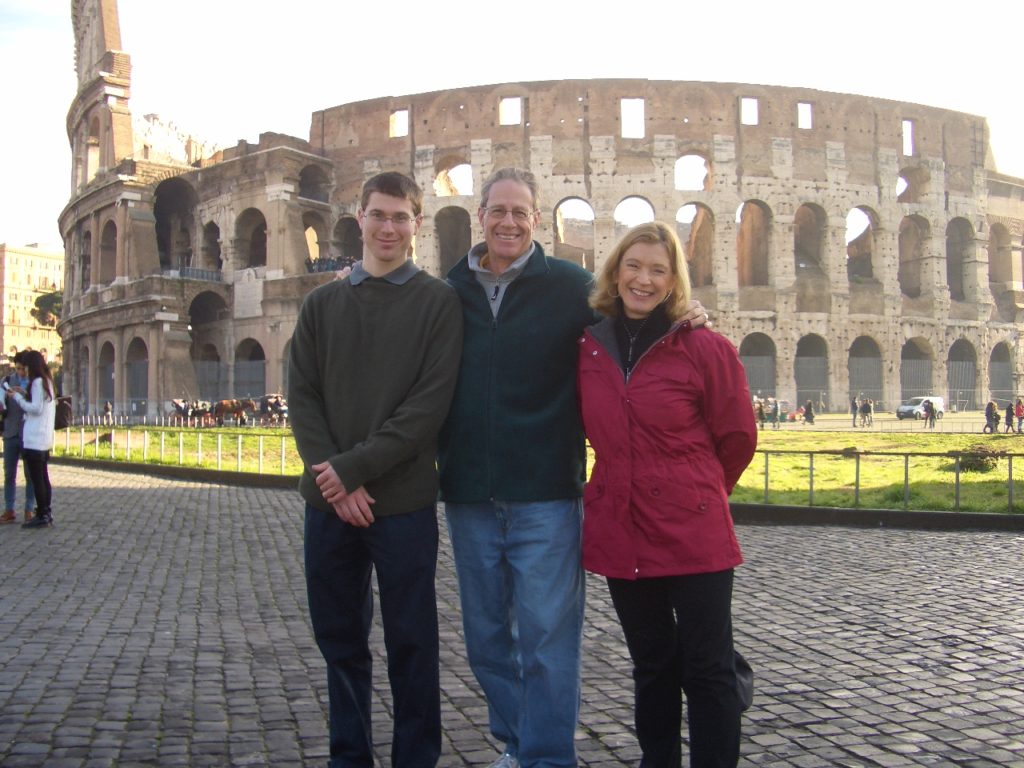

Imagine standing all alone in the footsteps of gladiators at Rome’s Coliseum. Or being almost the only car on the spectacular road that winds along the Amalfi Coast.
It may sound impossible. Tour groups tend to mob the major attractions during high season. But come to Italy during the winter and you’ll have the place to yourself, except for the people who actually live here.
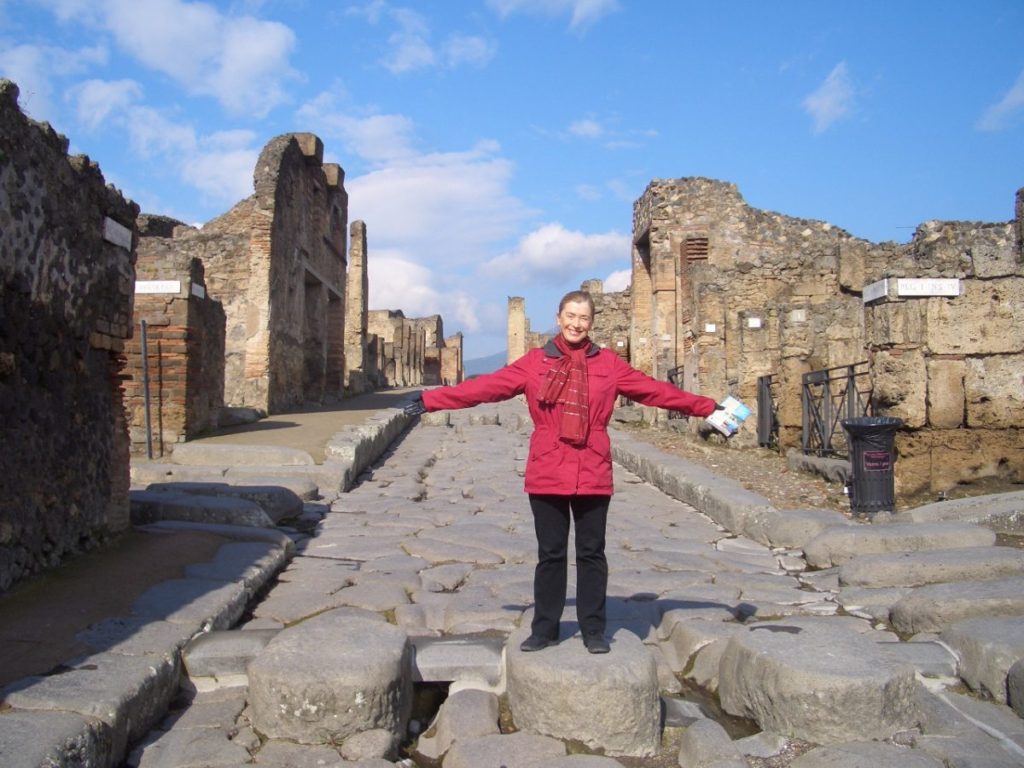
Plenty of room to roam in the ruins of Pompeii.
Touring Rome In February?
Our family decided to meet in Rome during our son’s “spring” break from grad school in Europe. It just happened to be the first three weeks in February. There are two major problems. Temperatures hover between 35 and 55 degrees Fahrenheit and it gets dark by 6 pm. So forget the warm nights of strolling past the Fountain of Trevi for a gelato. It’s too cold for ice cream. You’ll need to dress in layers. My hooded ski parka and long silk underwear kept me from freezing more than once. And we spent some evenings with wine and cheese in our apartment or hotel room rather than braving the nightly chill. But you can pack in a lot of sightseeing during the warmer daylight hours because you don’t have to compete with endless tour groups for tickets and photo opportunities.
Save Money with Rome and Vatican Sightseeing Pass
A word about how we roll: we’re a fit American couple traveling with a 20-something son, and we take the position that we can see the major sights of any city in about two full days. In Italy, the entire country shuts down for lunch between noon and 3 pm, so we planned our big meal for mid day and snacked for breakfast and dinner most of the time. We’re also into stretching our US dollars as far as possible. We purchased a 3-day Rome and Vatican Pass, which included admission to two major attractions, reduced admission to others, and unlimited rides on Rome’s metro and bus system. Skipping the lines for admission to the Sistine Chapel and other treasures of the Vatican? Priceless.
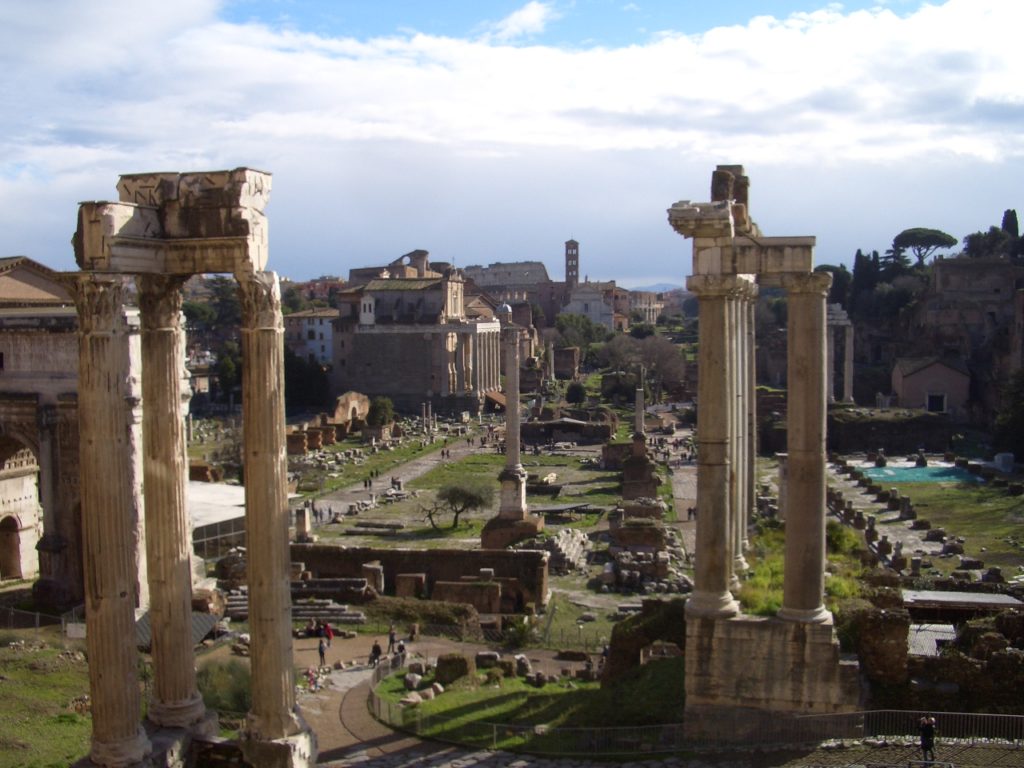
Almost alone with the ghosts of ancient Rome
First stop, the Coliseum in Rome. It was only a two-block walk from our apartment near the Cavour metro. If you arrive before 9 am, you might have to ask directions to the ticket booth because it’s not obvious when you’re the first people to show up. Combined with the Forum on Roma Pass, admission was free. Again, we had to hunt for the entrance to the nearby Roman Forum and Palatino, but wandered the ruins at leisure until lunch time when groups began to line up. It was a brisk walk to other major sights including the Piazza Navona and the Pantheon.
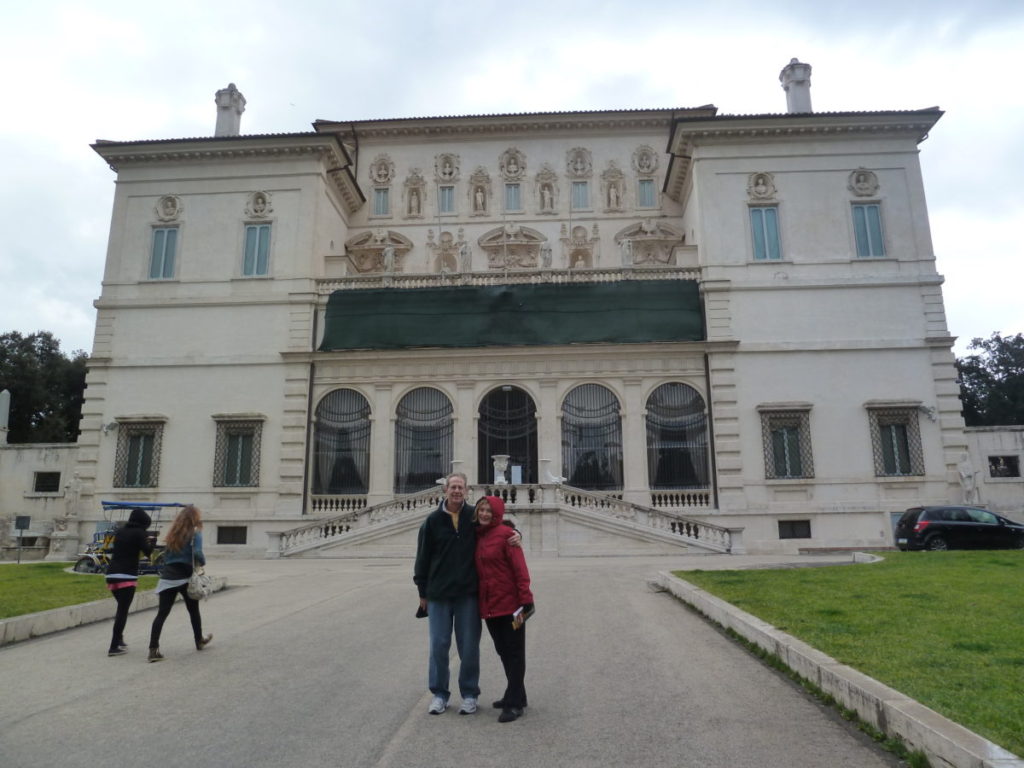
No problem to get a reservation at Villa Borghese in mid-February.
On Day 2, we reserved a tour at the Villa Borghese (also included in Roma pass) and saved a third day for Vatican City and its Museums. The only place we encountered anything that could be called a crowd was the Fountain of Trevi. I suspect it would be impossible to get near the place in the peak tourism season. We also learned to avoid the jam-packed metro trains during the evening rush hour.
Off-Season in Sicily
Farther south, in Sicily, we found another downside: some attractions, as well as a lot of hotels and restaurants, are closed in the winter. This worked in our favor at Villa Quartarella, a restored farm near the UNESCO baroque towns of Modica, Ragusa and Scicli. The owner, Francesco, says his five rooms are fully booked from March until September. In February, we were one of just two bookings. It was too cold to lounge by the pool, but there’s plenty to do.
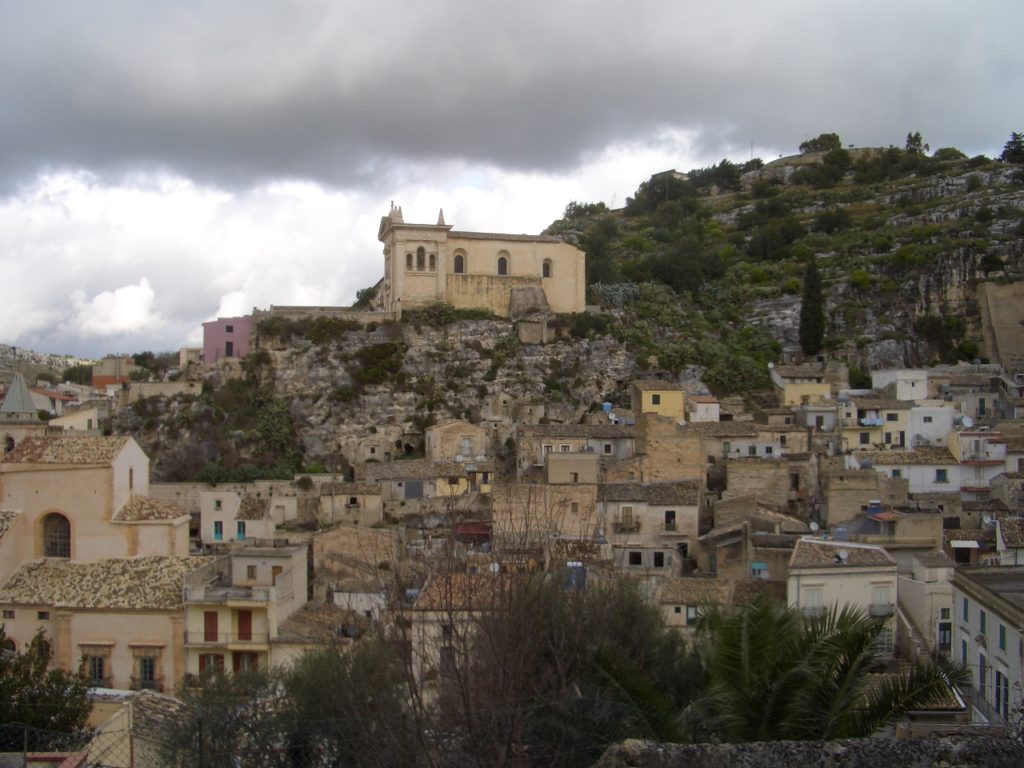
The baroque town of Scicli in Sicily. Everyone is sleeping in
Admiring the scenery and architecture was fun but frustrating at times, like when the baroque cathedral we had hoped to see in Ragusa was closed. The entire town seemed to have rolled up the sidewalks on a brisk Saturday afternoon. Forget about tour groups, there were virtually no people anywhere. We had better luck in nearby Modica, where Francesco had recommended a restaurant, the churches were open, and people were friendly. We hit Scicli first thing in the morning, when most of the local residents seemed to be sleeping in. So, again, we had the place to ourselves.
Fall in Love with Sorrento
We were fortunate to find a unique holiday apartment in Sorrento, as a home base for visiting Pompeii and the Amalfi Coast. Just about every hotel and restaurant along the coast road appeared to be closed, and any available parking was reserved for local residents, except in Amalfi, which has a large public lot. There, the cathedral was closed but we admired the exterior and hiked the steep staircases for unforgettable views and wood-fired pizza from a place that seemed to be doing a brisk takeout business with neighboring merchants.
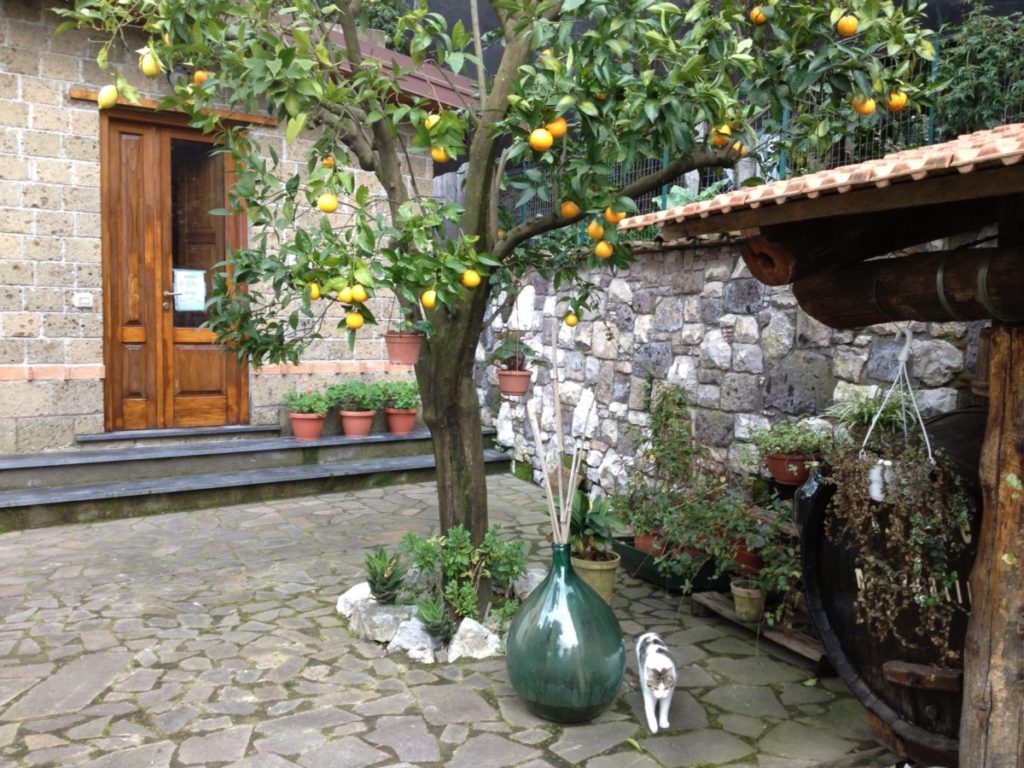
Many hotels close in the off season — but we loved this apartment, found on Trip Advisor.
The hairpin turns make the coastal road a nail-biter in the daytime because it’s barely wide enough for a car, and we got lost trying to find our way back to Sorrento at night. Trying to visit this area when it’s packed with tour buses in the summer must be an exercise in gridlock, even if you take the bus.
Italy is lively in the winter with festivals like Carnevale. We arrived while Sorrento celebrated the annual holiday of its patron saint with a street party and fireworks.
Terry’s Travel Tips
Restored stone buildings can be extremely chilly in the winter, so join the Italians in bundling up and cranking up the heat. You’ll be rewarded with an authentic experience no tour bus could deliver. Another option in the warmer months is to venture away from the most crowded sights. The Upbeat Path has a list of some worthwhile alternatives.
If you found this post helpful, please support my travel journalism by clicking on this link to buy your Roma Pass. It results in a small commission to me but no additional cost to you — and you’ll save tons of money on sightseeing in Rome.
We saved money on rental cars by booking in advance through Auto Europe before leaving the United States.
Want more stories on experiencing history and culture in authentic Europe? Like @strangersinthelivingroom on Facebook, and sign up for the occasional email when there is a new post here on the blog.
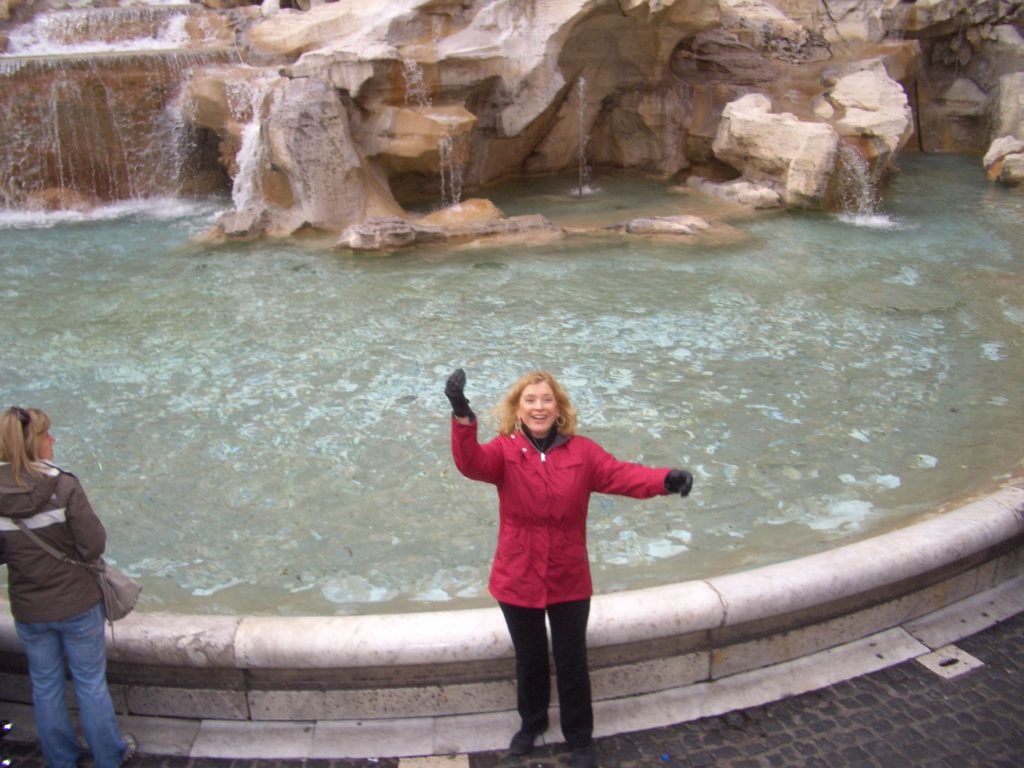
Throwing a coin in the Fountain of Trevi to ensure a return to Rome. Good luck getting this close in the summer!

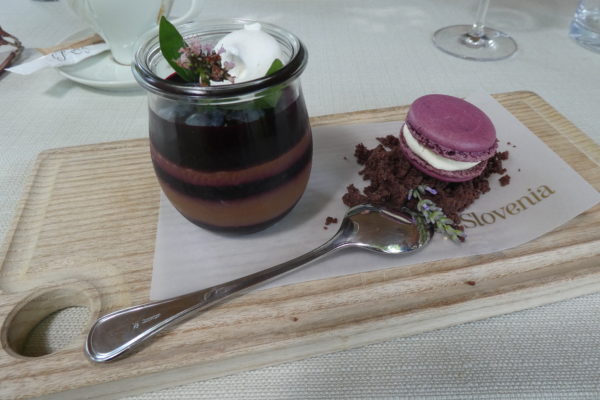
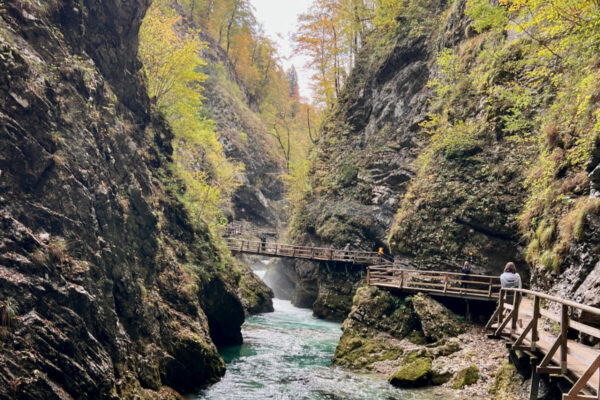
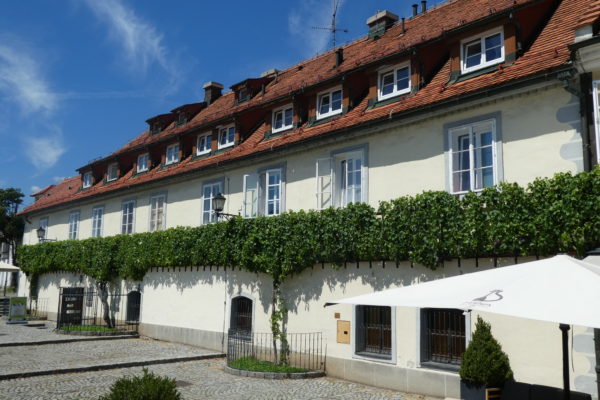
2 comments. Leave new
[…] — and skip the lines, which can get pretty long in the busy summer travel season. Then check out this post for some tips on avoiding the crowds by visiting Italy in the […]
[…] Without the intrusion of large modern-day tour groups, visitors to El Jem (sometimes spelled El Djem) have a chance to feel the history of the place. Of course, it is also possible to visit the Coliseum in Rome without the crowds, as I explain in this post. […]